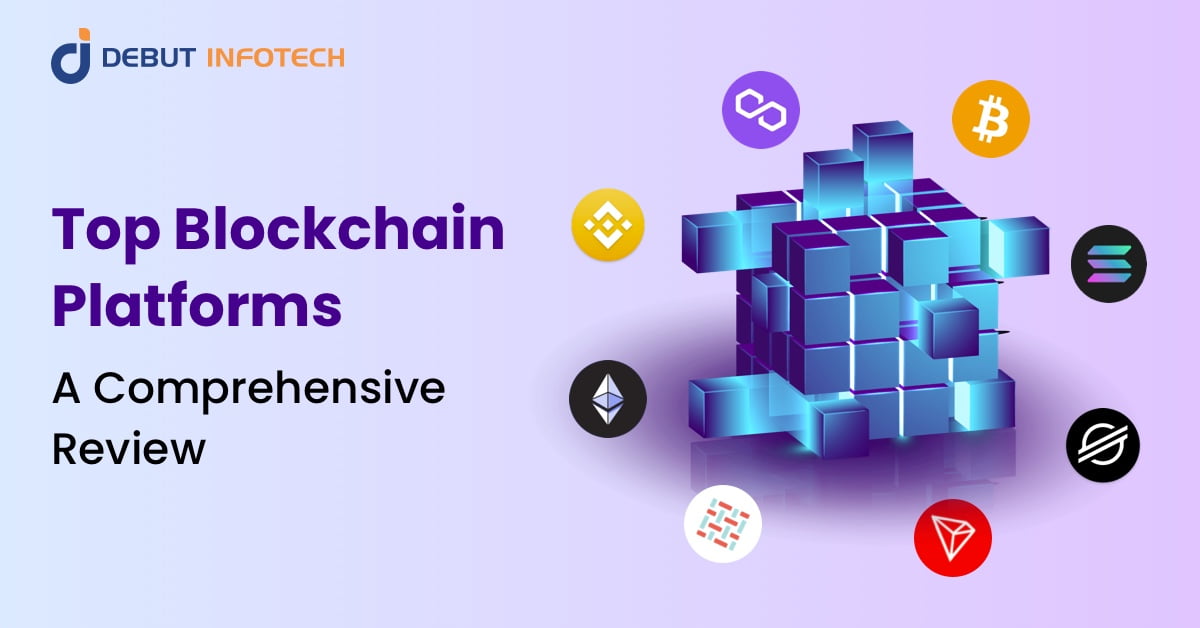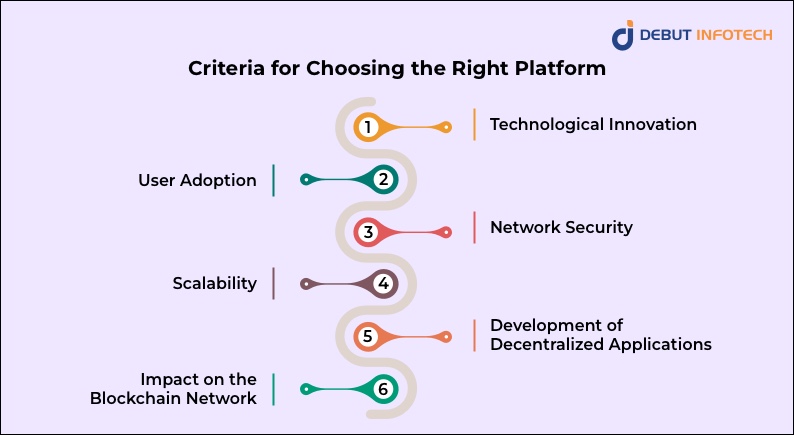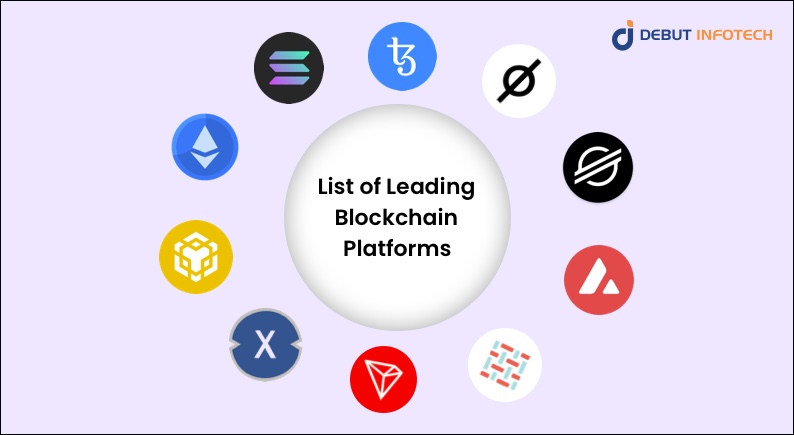Table of Contents
Home / Blog / Blockchain
Top 10 Blockchain Platforms for 2025: A Comprehensive Review
December 15, 2023

December 15, 2023
The blockchain landscape, ever-evolving and increasingly integral to various technological frontiers, is set to make even greater strides in 2025. This transformational technology, rooted in decentralized applications and digital assets has moved beyond mere digital currency applications. It’s reshaping sectors like supply chain, healthcare, and financial services, offering unparalleled transparency, security, and efficiency. As we venture into 2025, several blockchain platforms stand out, not just for their technological prowess but for their ability to adapt, innovate, and redefine the digital paradigm.
These platforms are more than just tools; they are ecosystems that foster innovation and development. They serve as the backbone for countless applications, driving change and bringing the potential of blockchain to the real world. As such, understanding which platforms lead the pack in 2025 is crucial for businesses, developers, and innovators looking to harness the power of blockchain technology.
This blog will highlight ten such platforms which have been renowned for the past years. If you’re looking to create blockchain innovations in 2025, one of these platforms would likely be your go-to.
Selection Criteria to Choose the Best Blockchain Development Platforms
Selecting the top 10 blockchain platforms for 2025 involves a nuanced understanding of various critical factors. We’ve highlighted our deciding factors below:

- Technological Innovation: Platforms that demonstrate cutting-edge advancements and unique solutions in blockchain technology.
- User Adoption: Platforms with a growing and active user base, indicating trust and functionality.
- Network Security: The ability of the platform to protect against cyber threats and ensure secure transaction processing.
- Scalability: Platforms that can handle an increasing number of transactions and users without compromising performance.
- Development of Decentralized Applications: The ease and efficiency with which developers can build and deploy dApps.
- Impact on the Blockchain Network: The overall influence of the platform on the broader blockchain ecosystem.
Read also this – Top 10 Enterprise Blockchain Development Companies 2025.
Wondering Which Blockchain Platform Fits Your Needs Best?
Compare top blockchain platforms, understand their features, and see which aligns with your business objectives.
Top 10 Blockchain Platforms of 2025
Here is an overview of 10 of the best platforms bringing disruptive innovations to the blockchain space:

1. Ethereum
Ethereum, conceived in 2013 by Vitalik Buterin and launched in 2015, rapidly established itself as a cornerstone in the blockchain world. It was the first platform to introduce smart contracts, revolutionizing how we think about digital agreements. This innovation positioned Ethereum not just as a blockchain platform but as a foundational technology for a myriad of decentralized applications, setting the stage for the expansive growth of the DeFi and NFT sectors.
Key Features:
- Smart Contracts: Ethereum revolutionized the blockchain space by introducing smart contracts, self-executing contracts with the terms of the agreement directly written into code.
- Ethereum Virtual Machine (EVM): Allows developers to create decentralized applications irrespective of the programming language.
- Decentralized Finance (DeFi): Ethereum is at the forefront of the Decentralized Finance movement, supporting various financial applications.
Advantages:
- Large Developer Community: Ethereum’s extensive developer base fosters continuous innovation.
- Widespread Adoption: As one of the earliest platforms, it enjoys broad-based support and recognition.
Disadvantages:
- Scalability Issues: Historically, Ethereum has struggled with network congestion and high transaction fees.
- Transition to Ethereum 2.0: While promising, the shift to a proof-of-stake consensus model is a complex process with many moving parts.
2. Binance Smart Chain
Binance Smart Chain (BSC), developed by the global cryptocurrency exchange Binance, was launched in September 2020 as a parallel blockchain to Binance Chain. It was designed to provide a high-speed, low-cost alternative to Ethereum, particularly for decentralized applications and smart contract functionality. BSC quickly gained traction in the blockchain community due to its compatibility with Ethereum’s existing tools and ecosystems.
Key Features:
- Ethereum Compatibility: BSC’s compatibility with Ethereum makes it easy for developers to port their projects over.
- High Transaction Speed: BSC offers faster transaction speeds compared to many other platforms.
Advantages:
- Lower Transaction Fees: BSC is more cost-effective for users and developers.
- Growing Ecosystem: An increasing number of projects are choosing BSC for their dApps.
Disadvantages:
- Centralization Concerns: There are debates about the level of decentralization in BSC, which could affect trust and security.
3. Solana
Solana, a relatively newer entrant, launched in March 2020, has swiftly climbed the ranks in the blockchain arena. Founded by Anatoly Yakovenko, Solana was developed to address the inherent limitations of older blockchain networks, particularly around throughput and scalability. Its innovative Proof of History consensus mechanism and focus on high-performance capabilities have made it a preferred platform for developers looking for speed and efficiency in their blockchain applications.
Key Features:
- Proof of History (PoH): A unique consensus mechanism that improves scalability and efficiency.
- High Throughput: Solana can process a large number of transactions quickly, making it suitable for high-frequency trading and similar applications.
Advantages:
- Rapid Processing: Ideal for applications that require fast and efficient transaction handling.
- Lower Cost: Offers lower transaction fees while maintaining high throughput.
Disadvantages:
- Hardware Requirements: Higher-end hardware is necessary for optimal network participation.
- Decentralization Trade-offs: Some argue that Solana’s focus on performance compromises its level of decentralization.
4. Tezos
Tezos first emerged in 2014, envisioned by Arthur and Kathleen Breitman, and went live in 2018. It distinguished itself in the blockchain space with its self-amending ledger, which allows the protocol to upgrade itself without the need for a hard fork – a feature that addresses common governance issues faced in blockchain networks. This innovation not only enhances the stability and longevity of the platform but also ensures that it stays current with the evolving demands and technologies.
Key Features:
- Self-Amending Ledger: Tezos can upgrade itself through an on-chain governance model, reducing the risk of divisive forks.
- Formal Verification: It allows developers to prove the correctness of their code, enhancing the security of smart contracts.
Advantages:
- Strong Governance Model: The self-amendment process ensures a more democratic and participatory approach to network upgrades.
- Increased Security: The focus on formal verification methods positions Tezos as a secure platform for high-value and critical blockchain applications.
Disadvantages:
- Less Mainstream Adoption: Compared to platforms like Ethereum, Tezos has a smaller developer community and user base.
- Complexity: The platform’s unique features can present a learning curve for new developers.
5. Cosmos
Launched in 2019, Cosmos aims to solve some of the most difficult problems in the blockchain space, particularly those related to scalability and interoperability. Its vision of creating an “Internet of Blockchains” allows different blockchains to communicate and transact with one another seamlessly. Cosmos stands out for its unique approach to connecting various blockchains while maintaining their sovereignty.
Key Features:
- Inter-Blockchain Communication (IBC): Cosmos facilitates interaction between independent blockchains.
- Modular Framework: It allows developers to build customized blockchains based on individual needs.
Advantages:
- Enhanced Interoperability: The ability to connect blockchains is a significant step forward in creating a more integrated blockchain ecosystem.
- Customizability: The modular nature of Cosmos allows for tailored blockchain solutions.
Disadvantages:
- Complexity for New Developers: The advanced concepts and architecture of Cosmos can be challenging for newcomers.
- Young Network: As a relatively new platform, it’s still proving its long-term viability and security.
6. Avalanche
Avalanche was launched in September 2020 by blockchain development company, Ava Labs, co-founded by Emin Gün Sirer, a well-known figure in the blockchain research community. It is designed as a high-throughput, low-latency platform, aiming to address the limitations of older blockchain protocols in scalability and speed. Avalanche has quickly gained attention for its novel consensus mechanisms and its ability to support a wide range of blockchain applications.
Key Features:
- Rapid Finality: Avalanche processes transactions quickly, with a finality time of under two seconds.
- Custom Blockchain Networks: It enables the creation of custom, purpose-specific blockchains.
Advantages:
- High Scalability: Avalanche’s unique architecture allows it to handle a large volume of transactions.
- Flexibility: Its support for custom blockchains makes it versatile for various use cases.
Disadvantages:
- Emerging Platform: Being relatively new, it’s still in the process of building its ecosystem and community.
- Competition: Faces stiff competition from established platforms in attracting developers and projects.
7. Hyperledger Fabric
Hyperledger Fabric, part of the Linux Foundation’s Hyperledger project initiated in 2015, represents a key player in enterprise blockchain solutions. Unlike public blockchains, Hyperledger Fabric specializes in private blockchain networks, offering modularity and versatility for various business applications. Its focus on privacy, performance, and scalability makes it a popular choice for businesses looking to leverage blockchain technology for operational improvements and innovation.
Key Features:
- Modular Architecture: Allows businesses to tailor their blockchain network to their specific needs.
- Privacy and Security: Fabric’s channels and private data collections enable confidential transactions and data storage.
Advantages:
- Enterprise-Focused: Specifically designed for business use, ensuring compliance and integration with existing systems.
- Flexible and Efficient: Supports various industries with its customizable and high-performance network.
Disadvantages:
- Complexity: The platform’s advanced features can be complex for those new to blockchain technology.
- Primarily for Private Use: Not as suitable for decentralized public applications compared to platforms like Ethereum.
- Integration with Debut Infotech: Debut Infotech leverages Hyperledger Fabric to provide robust and tailored blockchain solutions for enterprises. This includes creating secure and efficient supply chain management systems, financial service applications, and more.
8. XDC Network
The XDC Network, established by XinFin, is a hybrid blockchain platform that combines the benefits of both public and private blockchains. Launched in 2019, it aims to address specific challenges in global trade and finance, offering secure and efficient transaction solutions for businesses and institutions. The XDC Network stands out for its compatibility with legacy systems and its focus on optimizing supply chain and trade finance operations.
Key Features:
- Hybrid Blockchain: Balances the transparency of public blockchains with the security and privacy of private networks.
- TradeFinex Platform: A global marketplace for trade and finance built on the XDC Network.
Advantages:
- Efficient Transaction Processing: Optimized for high-speed and low-cost transactions, suitable for global trade.
- Interoperable with Legacy Systems: Facilitates easy integration with existing business infrastructures.
Disadvantages:
- Niche Focus: Primarily tailored for trade finance and supply chains, which might limit its appeal for broader applications.
- Emerging Ecosystem: Still growing its network and community, which may affect adoption rates.
- Potential Applications: The XDC Network is particularly well-suited for applications in global finance and supply chains, providing solutions for smart contracts, payments, and settlement processes.
9. Tron
Tron, founded by Justin Sun in 2017, quickly rose to prominence as a blockchain platform focused on content sharing and digital entertainment. It aims to decentralize the internet, allowing content creators to monetize their work directly. Tron’s acquisition of BitTorrent in 2018 further cemented its position in the digital content space, highlighting its commitment to creating a free, global digital content entertainment system.
Key Features:
- High Throughput: Tron is designed for high transaction speeds, making it suitable for content-related transactions.
- Content Sharing Focus: Emphasizes decentralized content distribution and storage.
- Impact on Content Sharing and Digital Entertainment: Tron is reshaping how digital content is shared and monetized, offering new opportunities for creators and consumers in the entertainment industry.
Advantages:
- Scalability: Capable of handling the demands of extensive digital entertainment networks.
- Creator-Friendly: Enables direct compensation for content creators through its decentralized platform.
Disadvantages:
- Centralization Concerns: Some critics point to potential centralization in Tron’s governance model.
- Competition in the Entertainment Sector: Faces challenges in competing with established content distribution networks.
Related Read: The Ultimate TON Blockchain dApp Development Guide of 2025
10. Stellar
Stellar, launched in 2014 by Jed McCaleb, co-founder of Ripple, is a blockchain platform with a distinct focus on connecting financial institutions and streamlining cross-border transactions. Designed to make financial services more accessible and efficient, especially in underbanked regions, Stellar operates as a bridge between the differing financial systems, enabling quick, reliable, and low-cost transactions across borders.
Key Features:
- Lumens (XLM): Stellar’s native digital currency, used to facilitate multi-currency transactions and prevent spam.
- Decentralized Exchange (DEX): Integrated into the Stellar network, allowing users to trade assets directly without the need for third-party intermediaries.
Advantages:
- Low Transaction Costs: Stellar makes cross-border payments and remittances more affordable.
- Inclusivity: Targets a broader audience, including underbanked communities.
Disadvantages:
- Focus on Financial Institutions: While beneficial for banking systems, it may not cater to all blockchain use cases.
- Market Competition: Faces competition from other blockchain platforms aiming to revolutionize financial services.
Stellar’s Role: Stellar is pivotal in streamlining cross-border transactions, reducing costs, and increasing transaction speed, making international finance more accessible and efficient.
Debut Infotech’s Role in Leveraging Blockchain Platforms
Debut Infotech stands at the forefront of blockchain innovation, effectively utilizing various platforms to develop tailored solutions for clients. As one of the top blockchain development companies in USA, their expertise spans creating custom decentralized applications, developing secure and efficient smart contracts, and offering strategic blockchain consulting.
Utilization of Platforms:
- Custom dApps Development:
Leveraging platforms like Ethereum and Tron for building decentralized applications that align with client needs. - Smart Contract Development:
Utilizing the robust capabilities of platforms like Ethereum and Hyperledger Fabric for creating secure and automated contracts.
Blockchain Consulting:
Debut Infotech provides comprehensive blockchain consulting services, guiding businesses in selecting the right blockchain platform and strategy, ensuring alignment with their specific operational needs and goals.
Let’s Discuss Your Blockchain Vision
Have questions or need personalized advice? Our experts are here to help you choose the best blockchain platform for your project.
FAQs
Q: What is a blockchain platform, and how does it differ from traditional databases?
A. A blockchain platform is a type of software infrastructure that uses distributed ledger technology to securely and transparently record transactions. Unlike traditional databases, blockchain platforms are decentralized and often employ consensus mechanisms for data validation.
Q: Why are smart contracts important in blockchain platforms?
A. Smart contracts automate contractual obligations and conditions, reducing the need for intermediaries, increasing efficiency, and minimizing the risk of fraud or disputes.
Q: How do public and private blockchains differ, and which platforms offer them?
A. Public blockchains like Ethereum are open to anyone, while private blockchains like Hyperledger Fabric are restricted and often used by enterprises for specific applications. Platforms vary in their approach, with some like XDC Network offering hybrid solutions.
Q: Can blockchain platforms handle large-scale financial transactions efficiently?
A. Yes, platforms like Stellar are designed to facilitate large-scale financial transactions efficiently, especially in cross-border scenarios, offering lower costs and faster processing times.
Q: What role do blockchain platforms play in the supply chain industry?
A. In the supply chain industry, blockchain platforms improve transparency and traceability, allowing for better tracking of products from manufacturing to delivery.
Q: How do blockchain platforms contribute to digital identity management?
A. Blockchain platforms provide secure and immutable identity management solutions, ensuring that digital identities are accurately verified and maintained.
Q: Are blockchain platforms environmentally sustainable?
A. Sustainability varies among platforms. Some, like Ethereum, are moving towards more energy-efficient consensus mechanisms (e.g., proof-of-stake) to reduce environmental impact.
Q: How does interoperability between different blockchain platforms work?
A. Interoperability involves the ability of different blockchain platforms to communicate and share information. Platforms like Cosmos are specifically designed to enable this interoperability.
Talk With Our Expert
Our Latest Insights
USA
Debut Infotech Global Services LLC
2102 Linden LN, Palatine, IL 60067
+1-708-515-4004
info@debutinfotech.com
UK
Debut Infotech Pvt Ltd
7 Pound Close, Yarnton, Oxfordshire, OX51QG
+44-770-304-0079
info@debutinfotech.com
Canada
Debut Infotech Pvt Ltd
326 Parkvale Drive, Kitchener, ON N2R1Y7
+1-708-515-4004
info@debutinfotech.com
INDIA
Debut Infotech Pvt Ltd
Sector 101-A, Plot No: I-42, IT City Rd, JLPL Industrial Area, Mohali, PB 140306
9888402396
info@debutinfotech.com



Leave a Comment